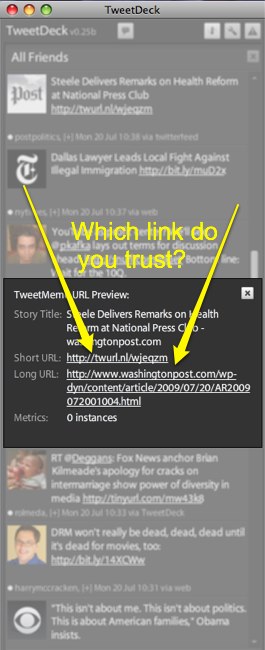Spammers like shortcut URLs, too. Should Twitter be worried?

If you've used Twitter, you know about URL-shortening services such as tinyurl and bit.ly. With only 140 characters at their disposal, users rely on these shortcut links to mask and share their favorite web pages, such as news stories.

Message Labs reports that the presence of short URLs in spam has skyrocketed in the last few days and now appears in more than 2 percent of all spam messages, according to a post on the New York Times' Bits blog.
Also see: CNET: URL shortening is hot--but look before you leap
A spam email with a bit.ly url appeared in my inbox just the other day. I have to admit that I paused for a minute when I saw it, recognizing the link but not the sender or the subject line. And the message inside was generic, like it was from a long-lost friend - you know, like someone who might have found me on the web somewhere.
It's easy to use caution in an email message and simply click delete but applying that type of scrutiny to a shortcut link sort of takes the oomph out of Twitter. After all, I'm happy following people that I don't actually know - people who have been recommended by friends and friends of friends and have posted shortcut links to some interesting posts. I click on their links regularly without giving it a second thought.
So where does that leave us? If spam in shortcut URLs becomes a bigger problem, then the power of Twitter diminishes significantly. Clicking on links posted by strangers becomes a risk. And I can't say that I'm willing to take that sort of risk.
What do you think about this? Share your thoughts in the talkbacks.